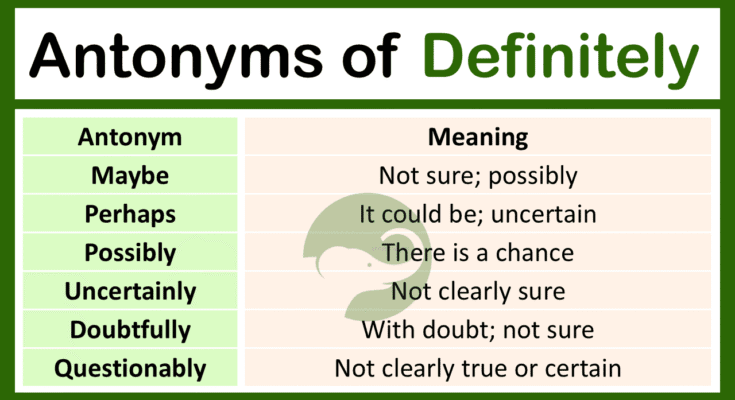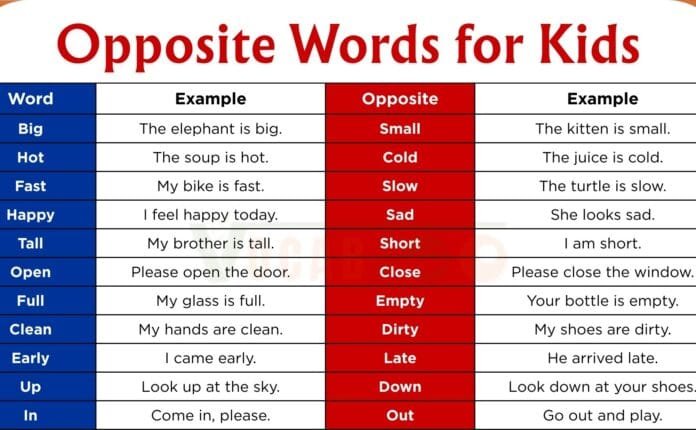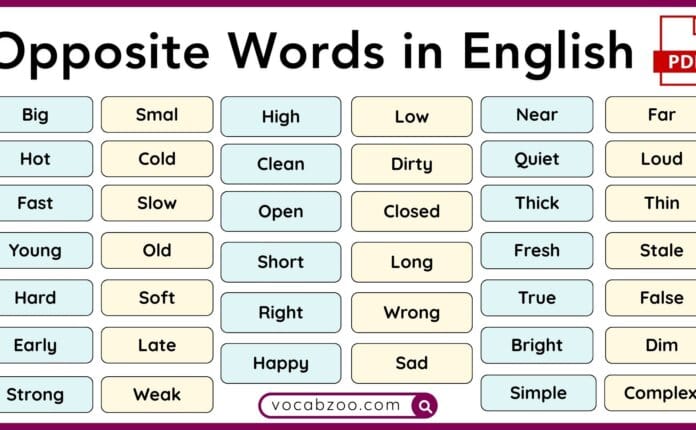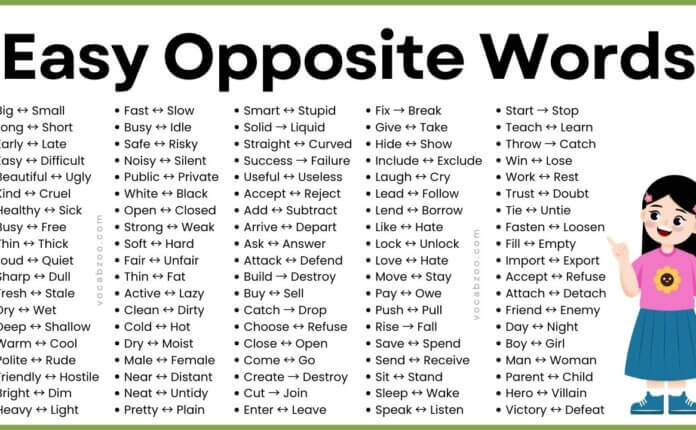Learning the Antonyms of Definitely in English helps you express doubt, uncertainty, or hesitation clearly. In this blog post, you will find 20 antonyms of definitely with meanings and examples to understand and remember easily. Knowing these words improves your speaking, reading, writing, and listening skills, making your English more precise and expressive. By the end, you will be able to use Antonyms of Definitely naturally in sentences and conversations.
What Does “Definitely” Mean?
The word definitely means certainly, clearly, or without doubt. It shows strong agreement or complete assurance about something.
Example: I will definitely come to your birthday party.
(Meaning: I am sure I will come.)
Meaning in Simple Words
Definitely is used when you are sure about something. Its antonyms are used when you are not sure, doubtful, or uncertain.
Common Antonyms of Definitely
Here is a list of common antonyms for the word definitely with meanings and example sentences:
| Antonym | Meaning | Example Sentence |
|---|---|---|
| Maybe | Not sure; possibly | I will maybe visit you tomorrow. |
| Perhaps | It could be; uncertain | Perhaps she will call you later. |
| Possibly | There is a chance | He will possibly join the meeting. |
| Uncertainly | Not clearly sure | She answered uncertainly when asked. |
| Doubtfully | With doubt; not sure | He looked at me doubtfully. |
| Questionably | Not clearly true or certain | The story is questionably accurate. |
| Vaguely | Not clear or exact | He spoke vaguely about his plans. |
| Ambiguously | Having more than one meaning | She replied ambiguously to avoid the question. |
| Unlikely | Not expected to happen | It is unlikely to rain today. |
| Doubtfully | With hesitation | She smiled doubtfully at the news. |
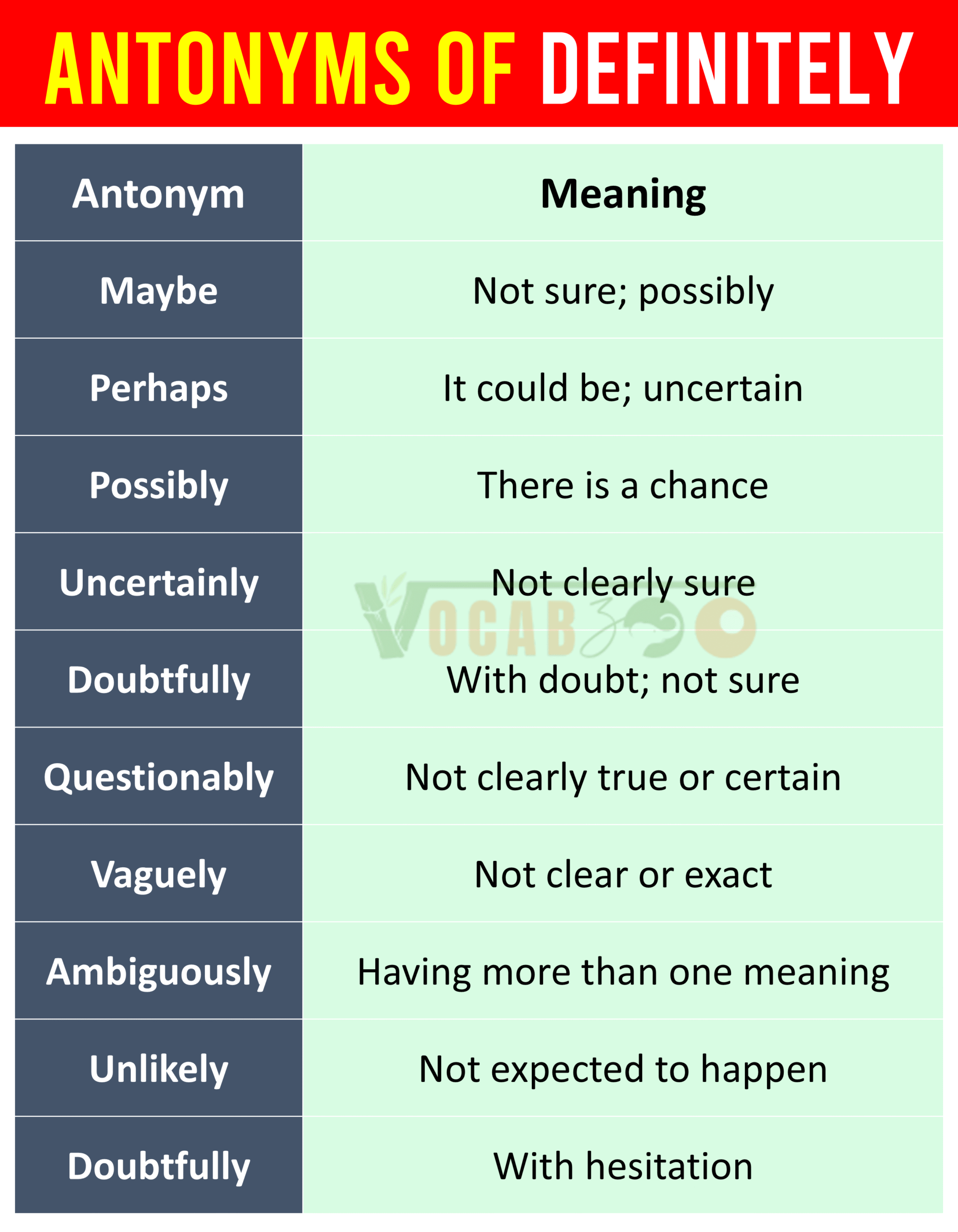
Different Contexts Where “Definitely” Is Used
Let’s see how the meaning of definitely changes depending on the context:
1. When Expressing Agreement
I will definitely help you.
(Antonym: I will maybe help you.)
2. When Showing Confidence
He is definitely the best player.
(Antonym: He is probably not the best player.)
3. When Giving an Assured Answer
Yes, definitely!
(Antonym: Not sure yet! or Maybe not!)
Complete List of Antonyms of “Definitely”
Here is a full list you can use in daily English:
Maybe, Perhaps, Possibly, Uncertainly, Doubtfully, Vaguely, Ambiguously, Questionably, Unlikely, Indefinitely, Tentatively, Hesitantly, Presumably, Conceivably, Potentially, Arguably, Supposedly, Theoretically, Unassuredly, Optionally
Easy Sentences with Antonyms
Here are some quick examples using antonyms of definitely:
- I will maybe go to the concert.
- She will perhaps agree with you.
- He will possibly come later.
- I’m not sure about the plan.
- It’s unlikely to happen soon.
- She replied vaguely, not giving details.
Summary for Antonyms of Definitely
| Word Type | Word | Opposite Word | Meaning Difference |
|---|---|---|---|
| Adverb | Definitely | Maybe | Sure vs Not Sure |
| Adverb | Definitely | Perhaps | Certain vs Possible |
| Adverb | Definitely | Possibly | Without doubt vs With chance |
| Adverb | Definitely | Uncertainly | Confident vs Doubtful |
| Adverb | Definitely | Ambiguously | Clear vs Confusing |
Final Tip
Use definitely when you are 100% sure,
and use its antonyms like maybe or possibly when you are not sure.
The word “definitely” adds certainty and strength to your sentences, while its antonyms express doubt, possibility, or uncertainty. By learning these opposite words, you can make your English more natural, balanced, and expressive in both speaking and writing.
FAQs about Antonyms of Definitely
What is the opposite of definitely?
The opposite of definitely is maybe or perhaps. These words show uncertainty or doubt instead of certainty.
What are some common antonyms of definitely?
Common antonyms of definitely include maybe, possibly, perhaps, uncertainly, doubtfully, and vaguely. These express that something is not sure or not confirmed.
How do you use the antonym of “definitely” in a sentence?
I will definitely come tomorrow. → I will maybe come tomorrow.
This change shows a shift from sure to uncertain.
Is “maybe” the best antonym of “definitely”?
Yes, maybe is one of the most common and natural antonyms of definitely in daily English. It is short, simple, and used in both spoken and written language.
What is the meaning difference between “definitely” and “possibly”?
Definitely means for sure or without any doubt, while possibly means there is a chance or it might happen.
I will definitely go. (sure)
I will possibly go. (not sure)
Read More
